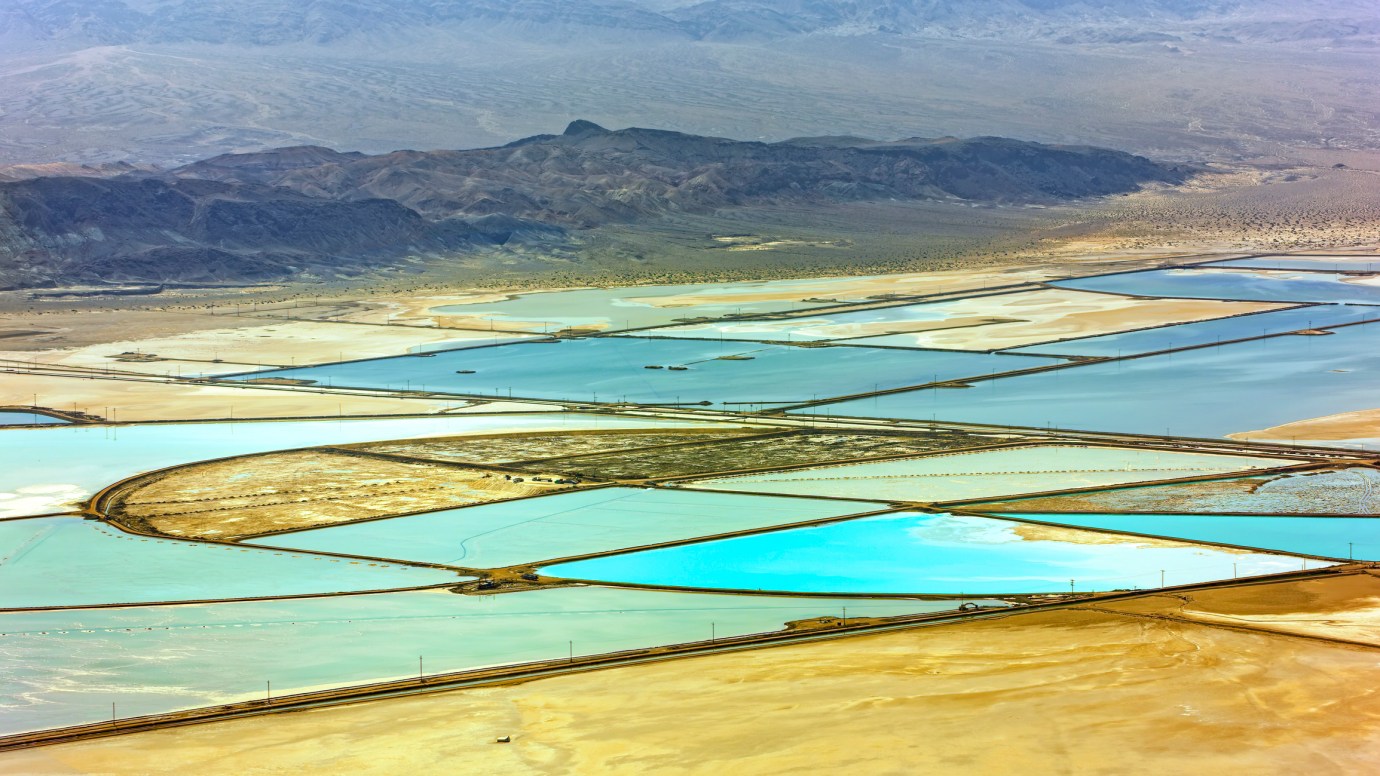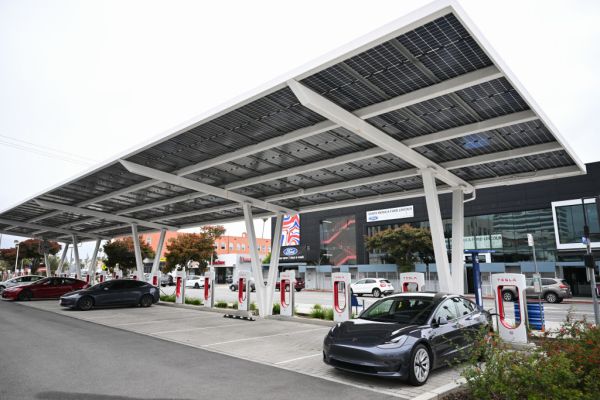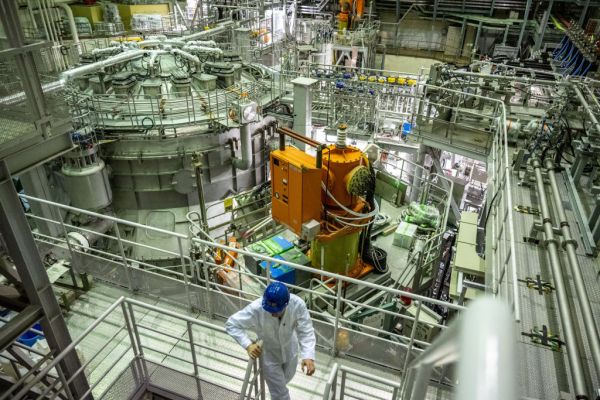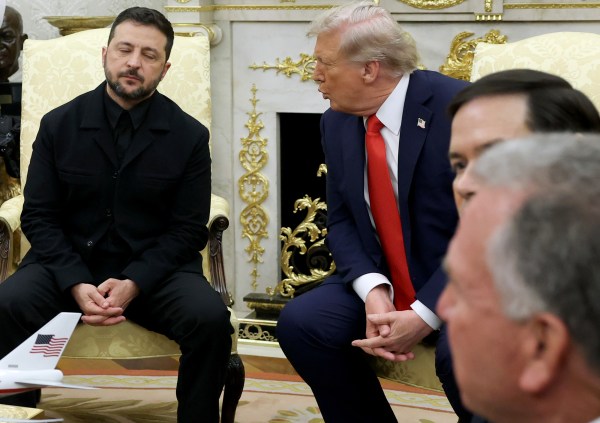Happy Tuesday! The U.S. Postal Service announced last week that it will issue a new Forever stamp next month that looks like a Jeopardy prompt and includes the text, “THIS NATURALIZED U.S. CITIZEN HOSTED THE QUIZ SHOW ‘JEOPARDY!’ FOR 37 SEASONS.”
Upside-down, along the bottom border of the stamp, lies the answer—or rather, the question: “Who is Alex Trebek?”
Quick Hits: Today’s Top Stories
- Israeli Prime Minister Benjamin Netanyahu said on Sunday that the Israel Defense Forces (IDF) is nearing the end of the high-intensity phase of combat operations in Gaza. “The intensive phase of the war is about to end,” he said. “But that does not mean that the war will be over.” He added that some troops would be redeployed to the border with Lebanon in anticipation of a full-scale war erupting with Hezbollah, the Iranian-backed terrorist group launching attacks against Israel’s northern communities. Netanyahu also appeared to walk back his support for a ceasefire proposal backed by the Biden administration to end the war, expressing interest in a “partial deal” that wouldn’t end the war. The Israeli premier clarified his remarks on Monday, saying he still supports the comprehensive proposal President Joe Biden put forward that lays out phases of hostage releases and ultimately a permanent ceasefire and full IDF withdrawal from Gaza.
- WikiLeaks founder Julian Assange, currently facing federal indictment for conspiring to obtain and share classified information related to leaks from a U.S. Army intelligence analyst in 2010, seems to have reached a plea deal with U.S. prosecutors. Assange was reportedly released from a British prison overnight and is en route to the Northern Mariana Islands, where, according to court filings on Monday, he will plead guilty to the charge under the Espionage Act. If the judge approves the deal, Assange will be released from British prison after being sentenced to time served and is expected to return to his native Australia.
- Pro-Palestinian, anti-Israel protesters staged a demonstration targeting the Adas Torah synagogue in Los Angeles on Sunday, blocking access to the place of worship, according to local officials, and violently clashing with counterprotestors and worshippers in the area. “I’m appalled by the scenes outside of Adas Torah synagogue in Los Angeles,” President Joe Biden tweeted yesterday. “Intimidating Jewish congregants is dangerous, unconscionable, antisemitic, and un-American.” According to the Los Angeles Times, police are investigating two reports of battery and arrested at least one person: a pro-Israel counterprotester carrying a sharp pole.
- The Supreme Court agreed on Monday to hear the Biden administration’s legal challenge to a Tennessee ban on gender transition treatment for minors during its next term. The administration argues that Tennessee’s prohibition violates the Equal Protection Clause of the Constitution, as drugs that are banned for the purpose of transitioning genders are permitted to treat other medical conditions. “The state has a compelling interest to protect children from experimental and unproven medical procedures,” Republican Tennessee Sen. Jack Johnson told CNN. “We want children suffering from gender dysphoria to get the important mental health treatment they need, but it’s not appropriate to subject children to irreversible procedures with lifelong health complications.” The 6th Circuit Court of Appeals agreed with Johnson, ruling the Tennessee law, along with a similar Kentucky statute, is constitutional.
- At least five civilians were reportedly killed and more than a hundred injured in the Russian-held city of Sevastopol, Crimea, after debris from intercepted Ukrainian missiles fell on a crowded city beach. The Russian Ministry of Defense claimed that Ukraine used U.S.-supplied ATACMS [Army Tactical Missile System] operational-tactical missiles equipped with cluster warheads to carry out the attack and that both Ukraine and the United States bore “responsibility for a deliberate missile strike on civilians.” The U.S. has been providing ATACMS missiles—which have a range of more than 150 miles—for more than a year. Ukrainian officials have defended the strike on occupied Crimea, calling the territory “a large military camp” home to “hundreds of direct military targets, which the Russians are cynically trying to hide and cover up with their own civilians.”
- A fire at a lithium battery plant in South Korea on Monday killed 22 workers—most of whom were migrants from China. The fire, which occurred less than 30 miles south of Seoul, is the deadliest in South Korea since a 2020 fire at a construction site killed 38 people. The victims were temporary employees who were likely unfamiliar with the structure of the building, a senior fire department official said Monday. South Korea has one of the highest industrial death rates in the world, while also relying heavily on migrant labor to staff factories amid declining birth rates.
- Several major record labels—including Universal, Sony, and Warner Music Groups—filed a lawsuit against two generative artificial intelligence startups, Suno and Udio, that allow users to create music using text prompts. The media giants allege that the AI companies use copyrighted material—including music from musicians like Lin-Manuel Miranda, Bruce Springsteen, and Michael Jackson—to train their models, and are seeking to prevent the startups from using these works in the future as well as up to $150,000 in damages per work used.
- The Florida Panthers beat the Edmonton Oilers 2-1 to win the Stanley Cup on Monday, concluding a historic series that went seven games. The Panthers clinched their first NHL title after squandering a 3-0 series lead. Had the Oilers won last night, they would have become only the second team in league history—after the 1942 Toronto Maple Leafs—to come back from such a deficit.
- The Tennessee Volunteers won the men’s Baseball College World Series on Monday, beating the Texas A&M Aggies 6-5 in the third game of the series to take home their first national baseball title. The Vols lost the first game in the series before securing back-to-back wins in the tournament in Omaha.
A Critical Catch-22

Fracking has long been a controversial undertaking in Pennsylvania. Panned by environmentalists for the knock-on effects and praised by its proponents for unlocking previously unreachable energy stores, the process of injecting water into wells in the earth to force oil and natural gas to the surface became a point of contention during the 2020 presidential race, when then-vice presidential nominee Kamala Harris had to walk back her own stated opposition to the practice in a vice presidential debate to clarify then-candidate Joe Biden’s vague stance.
And they had no idea that all that fracking was potentially unlocking their own green energy agenda. This spring, a Ph.D. student at the University of Pittsburgh analyzed samples of the wastewater from fracking at the Marcellus Shale formation in Pennsylvania and discovered enough lithium in the otherwise toxic water to cover some 30 percent of the current domestic lithium demand, once it can be separated from the wastewater. Eureka, as they say.
Lithium is a must-have mineral for the transition to greener forms of electricity, and the U.S. has no shortage of it—as the recently discovered deposit illustrates. But getting it out of the ground—or the wastewater—takes money, and investing that money might be a tough sell as the price of lithium fluctuates. The delay in getting mines off the ground potentially throws a wrench in a Biden administration priority and highlights the catch-22 of green energy policies built on expected demand for green technologies.
The device on which you’re reading this newsletter almost certainly contains a lithium-ion battery, of which lithium is—as you might expect—a critical component. Such batteries are lightweight but can hold a substantial charge and, crucially, be recharged, making them essential in most renewable energy sources, like solar and wind, as well as electric vehicles (EVs). EVs use a tremendous amount of energy, and a functional battery is the difference between a new-age, high-speed motor vehicle and an overpriced go-cart.
Lithium isn’t a rare mineral—there are plenty of known and suspected deposits, but only eight countries worldwide are in the lithium-mining business. “There isn’t a shortage of available lithium,” said Adam Webb, a product director for Benchmark Mineral Intelligence, a company that assesses prices and supply chains in the metal commodities market. “It’s the money needed to access it.”
The U.S. currently produces just 1 percent of the global lithium supply in its single lithium mine—in Silver Peak, Nevada, which turned to lithium extraction in the late 1960s after the gold and silver in the region began to dry up. The other 90-plus percent of lithium is mined from three countries: Australia, Chile, and China. That could change in years to come, as last week Serbia moved forward with a lithium mine project proposal and India—in partnership with the U.S.—plans to launch a similar project in South America.
Geologists suspect the U.S. has one of the largest untapped lithium deposits in the world, and it seems as though every third state in the union thinks it’s on the verge of a gold rush-style lithium boom. There are lithium mine projects in development in Arkansas, Arizona, California, Nevada, and North Carolina—and Texas also seems to have a promising lithium deposit.* Two mines in development—Thacker Pass Lithium Mine in northern Nevada and southern California’s Salton Sea project—are each projected to produce more than one-third of the current global lithium annual supply once completed.
Demand for lithium has mostly tracked with demand for EVs—and consequently, the batteries that power them. EV sales began to skyrocket in recent years, catching some manufacturers flat-footed as they tried to keep up with demand. But 2023 was a different story. Growth in EV sales slowed precipitously, especially in the back half of the year. Sales are still growing in 2024, but there’s a high barrier to entry for prospective EV buyers: The average price of an EV is just under $60,000 and interest rates have remained high, making money expensive and making buyers wary of big purchases.
That rapid growth in EV sales goosed the price of lithium and other essential minerals found in batteries, like cobalt. Lithium prices reached their zenith in November 2022 before collapsing entirely as demand for EVs cooled more than the markets had expected and China, in particular, built out its EV battery capacity to such an extent that battery supply was eclipsing demand.
While a glut of this incredibly useful resource may be a good thing in the short term, the bottomed-out prices make it difficult for developers to justify standing up a new mine or processing plant. Plus, the timeline for a lithium mine development—from discovery to extraction—can range from two to ten years, Webb told TMD, so a surplus now could make it difficult to catch up to increased demand later. “To take the lithium pores from the mine, to convert it into a chemical … can be difficult,” he said. “And [it] does require capital investment, but also the relevant expertise.” Albemarle Corp, the world’s largest lithium producer, pulled the plug earlier this year on a planned $1.3 billion lithium processing plant in South Carolina to support a mine it’s trying to reopen in North Carolina. The company also laid off 4 percent of its workforce at the beginning of this year in an effort to cut costs.
That boom-and-bust cycle is a cautionary tale for the Biden administration as it tries to increase demand for clean technologies and EVs with tax incentives while simultaneously increasing the supply of batteries and the lithium to produce them. In June 2021, the Department of Energy projected that global demand for lithium-ion batteries would multiply between five and ten-fold by 2030. To meet what it expected to be rising demand, the White House has tried to boost domestic lithium production.
Last month, for example, the Biden administration increased tariffs on foreign lithium-ion batteries from 7.5 percent to 25 percent, mostly to protect the U.S. industry from Chinese dominance. But as Scott Lincicome pointed out at the time, the move is unlikely to work as expected. “Prices will likely be higher,” he wrote in Capitolism, “discouraging consumption of the very environmental goods the government is trying to promote and harming downstream American manufacturers that need access to low-cost inputs.”
But tariffs aren’t the only arrow in the Biden administration’s quiver. It also granted a $2.26 billion loan for the Thacker Pass mining project earlier this year, and, two years ago, federal agencies teamed up with the AFL-CIO labor union to form the Lithium-Battery Workforce Initiative, a $5 million project intended to increase domestic production by training workers in the battery manufacturing industry.
Mining’s cost isn’t the only roadblock, however; state regulations have also delayed lithium projects. A proposed lithium mine in Maine has been held up for violating the state’s environmental regulations, though the state is considering a possible exemption to allow the project to move forward. Indeed, some conservation advocates highlight the environmental harms of lithium mining. The process of extraction emits carbon dioxide into the atmosphere—15 tons per ton of lithium mined—and runs the risk of polluting the air with harmful chemicals and depleting or contaminating the water supply. The U.S. Fish and Wildlife Service is currently reviewing whether the brine mining that would be involved in the proposed Thacker Pass mine project could push a minuscule snail species to the brink of extinction. In California, environmental non-profit groups have challenged the proposed Salton Sea lithium mine by suing county officials for granting permits for the project, contending the proposal is in violation of county and state environmental laws.
Property disputes with Native American tribes have also delayed lithium mining projects. A group of Nevada tribes sued to block the Thacker Pass mine last year, arguing the land is a sacred memorial site and the historical location of an 1865 native massacre by U.S. forces. A federal judge ruled against the native tribes in November and construction on the site has since continued.
But for the companies putting their money where their mouths are—with the Biden administration’s backing—to brave the vicissitudes of the industry, there’s ultimately only one thing that matters when it comes to the viability of a lithium deposit, per Webb: “Can you make money from it?”
Worth Your Time
- What will the future of war look like? Writing for UnHerd, Edward Luttwak explained the growing phenomenon of “post-heroic warfare” and who is likely to benefit from this change in military will. “Why is it that, with larger populations than ever before, our tolerance for casualties is increasingly low?” he asked. “Back in 1994, I offered a simple theory: the wars of history were fought by ‘spare’ male children. … Today, however, with the average fertility of women across Europe less than two and still falling—the EU average was 1.46 in 2022—there are no spare children.” In light of this theory, Luttwak believes we have been getting great power politics all wrong. “All across Europe, entire military institutions are colluding from top to bottom to sustain the illusion that they are capable of combat. … But to some extent, the same can be said of their adversaries in Russia and China. In our current post-heroic age, everyone’s calculations of the true balance of power need to be revised.”
- Writing for the New York Review of Books, Mark Lila explored what he considers to be the pitfalls of the Catholic post-liberal project. “It is possible to attend right-wing conferences whose speakers include national conservatives enamored of the Peace of Westphalia, secular populists enamored of Andrew Jackson, Protestant evangelicals enamored of the Wailing Wall, paleo-Catholics enamored of the fifth-century Church, gun lovers enamored of the nineteenth-century Wild West, hawks enamored of the twentieth-century cold war, isolationists enamored of the 1940s America First Committee, and acned young men waving around thick manifestos by a preposterous figure known as the Bronze Age Pervert,” he wrote. “And they all get along. The reason, I think, is that these usable pasts serve more as symbolic hieroglyphs for the right than as actual models for orienting action. … The post-liberals are stuck in a repetition of mistakes made by many right-wing movements that get so tangled up in their own hyperbolic rhetoric and fanciful historical dramaturgy that they eventually become irrelevant.”
Presented Without Comment
Shelby Busch, the first vice chair of the Maricopa County Republican Committee, said in March she would “lynch” Stephen Richer, a Republican who serves as the county recorder and who rejected lies about the 2020 election being stolen:
But if Stephen Richer walked in this room, I would lynch him. I don’t unify with people who don’t believe in the principles we believe in and the American cause that founded this country. And so I want to make that clear when we talk about what it means to unify.
Also Presented Without Comment
Former House Speaker Nancy Pelosi, asked by Anderson Cooper whether she has “confidence” in the Supreme Court:
“No, I think they’ve gone rogue. It’s most unfortunate.”
Also Also Presented Without Comment
New York Post: Trump Camp Claims He Was ‘Tortured’ in Fulton County Jail—as It Peddles Coffee Cups With His Mugshot
In the Zeitgeist
A Canadian team has not won the Stanley Cup in more than 30 years. And this year, the Edmonton Oilers lost to *checks notes* the Florida Panthers—even after the Panthers blew a 3-0 lead in the series. Florida Man strikes again.
Toeing the Company Line
- We know our crop of summer interns just started, but it’s already time to think about the fall! If you are an undergraduate or master’s student looking to get some real-world journalism experience before you graduate, we hope you’ll check out our 2024 fall internship listing!
- In the newsletters: Kevin dove into (🔒) Surgeon General Vivek Murthy’s push to add warning labels to social media platforms and the Dispatch Politics crew examined Colorado Democrats’ efforts to boost a “Stop-the-Steal” Republican.
- On the podcasts: In a special edition of Advisory Opinions recorded last month, Sarah interviewed retired Supreme Court Justice Stephen Breyer about his judicial philosophy, the future of the court, and more.
- On the site today: John reports on what Supreme Court nominees could look like in Trump’s second term, Chris pans the primary system, and Cole Murphy, one of The Dispatch’s summer interns, checks in on the presidential race in Georgia.
Let Us Know
Should the Biden administration be intervening to promote the development of lithium mines now in anticipation of a spike in demand for EVs?
Correction, June 25, 2024: There is not currently a lithium mine project in the works in Washington state as this newsletter originally indicated.











Please note that we at The Dispatch hold ourselves, our work, and our commenters to a higher standard than other places on the internet. We welcome comments that foster genuine debate or discussion—including comments critical of us or our work—but responses that include ad hominem attacks on fellow Dispatch members or are intended to stoke fear and anger may be moderated.
With your membership, you only have the ability to comment on The Morning Dispatch articles. Consider upgrading to join the conversation everywhere.